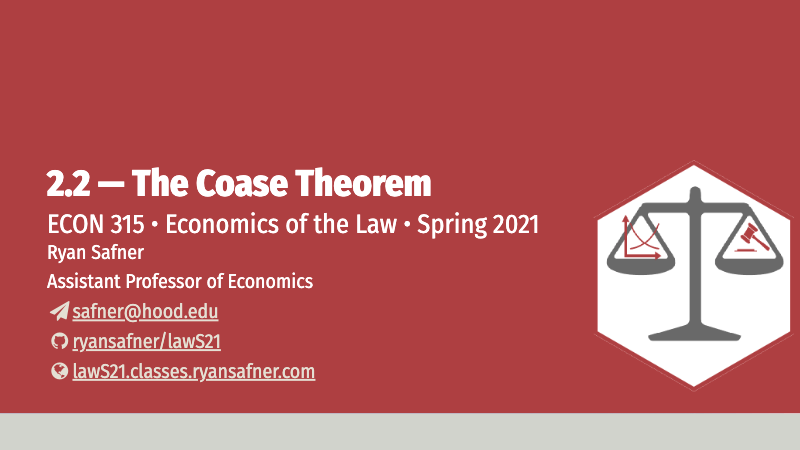2.2 — The Coase Theorem — Class Content
Contents
Tuesday, February 23, 2021
Overview
We continue our introduction to property by spending time on a principle that undergirds the entire law & economics analytical approach, what is often called “The Coase Theorem.” It is often misunderstood and misapplied, so it is worth spending some time unpacking and discussing what Ronald Coase’s famous 1960 paper, “The Problem of Social Cost” is advocating.
Readings
Required Reading
Optional but Useful Reading
- Ch. 4 in Cooter and Ulen, 2012, Law & Economics
- Ch. 4 in Friedman, 2000, Law’s Order
- Coase, 1992, “The Institutional Structure of Production”
- McCloskey, 1998, “The So-Called Coase Theorem”
- Medema, 2020, “The Coase Theorem At Sixty”
- Pierson v. Post
- Pierson v. Post (Opinion of the Court)
The primary reading that is required of you is Ronald Coase’s famous 1960 paper, “The Problem of Social Cost.” This is one of the most cited papers in the 20th century, and is almost single-handedly the foundation of law and economics as a discipline. Coase’s important contributions in the paper, and the “Coase Theorem” (not they are not necessarily the same thing!) have been debated and interpreted in different ways over the past 60 years.
It is important that you understand what it is Coase is trying to say, and hence, I have provided several additional readings that are optional, but highly recommended to assist in your interpretation. Coase (1992) is his Nobel Prize lecture, and in part, he reflects on the meaning of Coase (1960). McCloskey (1998) provides a good interpretation of what Coase’s actual point was, which got lost in George Stigler’s formulation of the “Coase Theorem.” Medema (2020) provides a highly extensive discussion of all of the debates, interpretations, and applications of the Coase theorem over ythe past 60 years.
Questions To Help Your Reading
Coase (1960) is quite lengthy and detailed, weaving back and forth between theoretical examples and real world legal cases. You will have a full week to read this, but focus on sections I, II, V, VI, VII, the last paragraph on p.27-p.29, IX, X.
Coase uses many examples, often involving complex legal cases. The laws and quotes of the opinions of judges is not important here. You need not remember or master them all, but understand the consistent logic behind all of them.
This article is credited with the creation of “The Coase Theorem.” What is it, according to Coase?
What kind of studies or examinations is Coase calling for economists to do that they did not normally do before?
How do transaction costs (Coase calls these “the cost of using the market”) change or affect his model/examples?
What is the Pigouvian approach to externalities, and what does Coase have to say about it?
What is the decision that needs to be made, according to Coase, when attempting to resolve an externality?
Slides
Assignments
Discussion Board
Starting this week, we will occasionally have a weekly discussion board open on Blackboard.Not every week. I will let you know when we have one open at the beginning of each week.
You will be expected to contribute to the discussion board at least twice by Sunday night. Your weekly contribution will be graded out of 5 points. At the end of the semester, I will apply the average of your weekly participation grades to apply (10%) towards your final course grade.
I am interested in your thoughts, reactions, comments, and questions about any of the material (lectures and/or readings). You do not need to write more than a paragraph. Anything more than that, including continuing to reply to each others’ thoughts, questions, or comments, (which I strongly hope you do!) is solely based on your own interest and curiosity. I will jump in to answer questions the group is stuck on, give my two cents, and stir the pot as needed. I strongly hope we still keep a conversation going and can learn from each other, that was always my goal, not to lecture at you!
Rubric:
| Category | 3 Points | 2 Points | 1 Point | 0 points |
|---|---|---|---|---|
| Quantity | More than 2 replies/started threads | 2 replies/started threads | 1 reply | 0 posts |
| Quality | Extremely thought provoking, demonstrates clear grappling with readings, adds to conversation | Provides a well-reasoned reply, suggests familiarity with readings, keeps conversation going | A simple reply, may make no reference to readings or ideas, makes further conversation difficult | Minimal effort |
Recall, these are out of 5 points. Notice it is possible to get above 5 points for a truly remarkable week of contributions, but I give these sparingly.
At the end of the semester, I will drop your lowest participation score.
